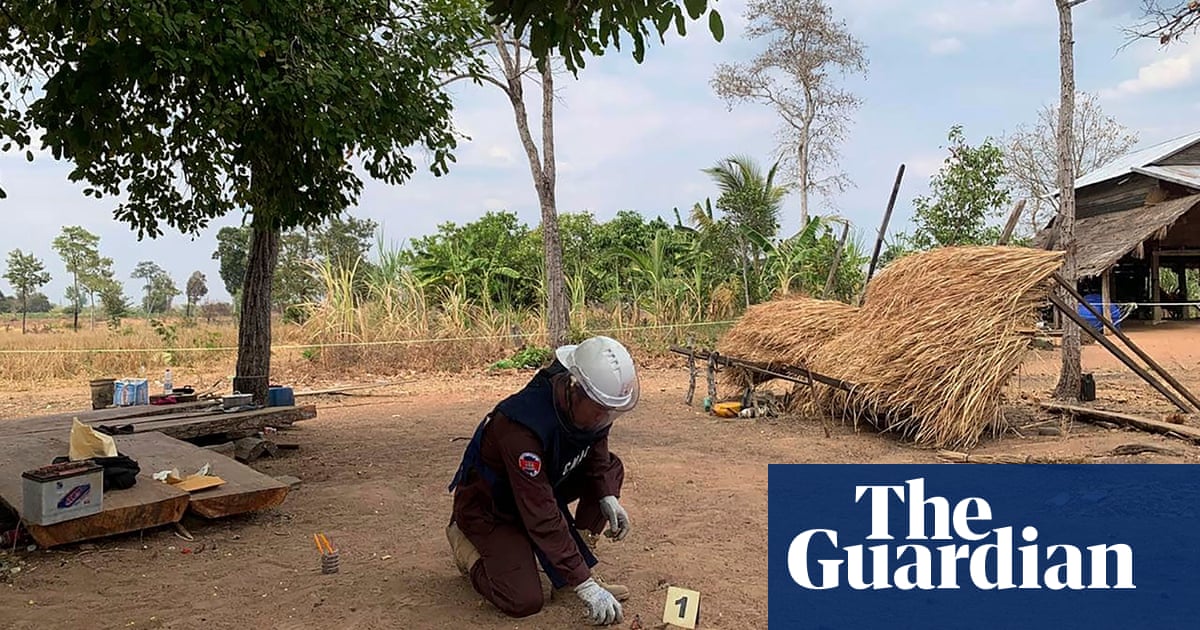Happy Thursday! Elon Musk has described his DOGE campaign as the “wood chipper for bureaucracy.” Perhaps he could learn some efficiency lessons from some of nature’s woodchippers, like these Czech beavers who finished a government dam project before workers ever broke ground.
Quick Hits: Today’s Top Stories
- President Donald Trump spoke with Russian Vladimir Putin Wednesday on a phone call that Trump said marked the beginning of negotiations to end the war in Ukraine. The conversation followed a meeting of Ukrainian allies at NATO’s headquarters in Brussels on Wednesday, during which Defense Secretary Pete Hegseth laid out the administration’s vision for resolving the conflict. “The United States does not believe that NATO membership for Ukraine is a realistic outcome of a negotiated settlement,” he said. Hegseth also described Russia’s return of the Ukrainian land it has seized since the 2014 invasion of Crimea as an “unrealistic objective” and said that any Ukrainian security guarantees as part of a settlement would not be provided by U.S. forces. Any European peacekeeping troops deployed should not be done so as part of a NATO mission, he added.
- Multiple outlets reported Wednesday that Alexander Vinnik, a Russian bitcoin exchange founder convicted of money laundering, will be released from U.S. custody as part of the exchange that freed Marc Fogel, the American teacher who had been imprisoned in Russia since 2021. Secretary of State Marco Rubio said Tuesday that Fogel’s release “was not in return for anything.” Separately, the White House announced Wednesday that an unidentified U.S. citizen and two other non-citizens including a Radio Free Europe journalist had been released from detention in Belarus. The eastern European country led by President Alexander Lukashenko, a long-serving dictator and close Putin ally, released an American woman in January who had been detained since December.
- The Senate voted 52-48 on Wednesday to confirm Tulsi Gabbard as the director of national intelligence. Sen. Mitch McConnell, the sole Republican vote against Gabbard’s nomination, released an extended statement explaining his opposition. “The nation should not have to worry that the intelligence assessments the President receives are tainted by a Director of National Intelligence with a history of alarming lapses in judgment,” he said. Meanwhile, the Senate voted 53-47 Wednesday to advance Robert F. Kennedy Jr.’s nomination to lead the Department of Health and Human Services, with a confirmation vote expected today.
- A federal judge lifted a temporary restraining order Wednesday on the Trump administration’s federal employee deferred resignation plan. U.S. District Court Judge George A. O’Toole Jr. had previously paused the administration’s February 6 deadline for employees to accept the buyout after federal labor unions filed a lawsuit challenging the program. In his Wednesday order, O’Toole concluded the unions’ lawsuit lacked standing. Following the ruling, the Office of Personnel Management announced Thursday that the program was now closed and that 75,000 federal workers had accepted the offer.
- The Consumer Price Index (CPI) rose 0.5 percent month-over-month and 3 percent annually in January, the Bureau of Labor Statistics reported Wednesday, up from 0.4 and 2.9 percent, respectively, in December. Both were slightly above economists’ expectations. While testifying before Congress Wednesday, Federal Reserve Chair Jerome Powell said the CPI numbers show “we’re not quite there yet” in bringing down inflation and consequently, the central bank wants “to keep policy restrictive for now.”
Africa’s Forgotten War Rekindles

After bearing witness to waves of fighting throughout the 1990s and early 2000s, the eastern Congo city of Bukavu may once again find itself at the center of a decadeslong armed conflict. Home to 1.3 million people, the regional capital of the South Kivu province has begun closing schools and businesses in preparation for an imminent attack as M23 rebels advance toward government-held positions in the volatile Great Lakes region.
Hailed by some Congolese as liberators and denounced by others as foreign invaders, the armed group is now threatening to push “all the way to Kinshasa”—the country’s far-off capital—in its campaign against President Félix Tshisekedi’s government. The renewed violence, which the United Nations estimates has left nearly 3,000 people dead and displaced 700,000 others since January, marks the latest bloody chapter of what has long been described as Africa’s forgotten conflict. And it shows no signs of slowing, as longtime ethnic rivalries rear their heads.
Leaders of southern and eastern African countries gathered in Dar es Salaam, Tanzania, on Saturday to call for negotiations toward a ceasefire. But neither Kinshasa nor M23 appear eager to engage in talks. Last month, the rebels captured the city of Goma—the largest city in eastern Congo with an estimated population of 2 million—setting off a wave of unrest across the country, including the capital. Pro-government rioters attacked the American Embassy in Kinshasa in January, accusing the U.S. and other foreign allies of looking the other way while the insurgency in the east gained traction.
Compounding the crisis is the Congo’s looming humanitarian disaster. Despite its abundance of natural resources, it remains one of the poorest countries in the world, ranking 180th out of 193 countries in the latest Human Development Index. The U.N. warned last month that more than 21 million people were in need of live-saving humanitarian aid, while another 1 million were displaced in neighboring countries.
Tshisekedi blames M23 and its Rwandan backers for the instability gripping Congo, while the armed group says it’s fighting a discriminatory and deeply corrupt government. But despite its new faces, the conflict in eastern Congo predates both the Congolese president and the rebel faction. Many analysts view this latest round of fighting as a direct spillover from the 1994 Rwandan genocide—a killing spree by the ethnic Hutus against their Tutsi neighbors that left more than 800,000 people dead in 100 days.
When a Tutsi uprising led by Rwanda’s current president, Paul Kagame, put a stop to the massacre, many Hutus fled into Congo and shortly thereafter began the process of re-arming. Congolese Tutsis did the same, leading to the outbreak of the First Congo War two years after the Rwandan genocide. That conflict and subsequent wars have led to some 6 million deaths in the last three decades.
M23 formed in 2012 in response to what it described as the Congolese government’s ethnic incitement against Tutsis. After its establishment, the Tutsi-dominated militia—which takes its name from March 23, 2009, the date of a peace deal that it claims Kinshasa reneged on—quickly seized Goma but later withdrew from the city following a ceasefire. After years of low-level insurgency, it launched another full-scale offensive in North Tivu in 2022 and has been fighting ever since, expanding into the neighboring province of South Tivu last month.
As with most conflicts, civilians have suffered the most. Both the Congolese army and the rebel group—one of dozens operating in eastern Congo—have a record of human rights abuses, including extrajudicial executions, forced evictions, and sexual violence. Washington has previously sanctioned both M23 and Kinshasa-aligned militias over their roles in destabilizing the region, and the new administration appears on track to continue that approach. The U.S. is “deeply troubled by escalation of the ongoing conflict in eastern DRC, particularly the fall of Goma to the Rwandan-backed M23 armed group,” a State Department spokeswoman said in January.
The Congolese government also accuses M23 of looting valuable minerals on behalf of neighboring Rwanda, which it says arms and trains the fighters—a charge that Kigali denies. Raw materials are Congo’s biggest exports and China is its biggest customer, relying on Congo for 67.5 percent of its refined cobalt supply. According to a December report by the U.N., at least 150 tons of coltan were smuggled into Rwanda last year. The rare mineral is essential for the production of electronic components.
But some analysts argue that understanding Congo’s war through the narrow lens of cross-border resource competition is counterproductive. The international community has for decades sought to rid supply chains of conflict minerals through sanctions and other penalties, yet hostilities persist. And what the U.N. considers smuggling into Rwanda, many Congolese view as a legitimate way to circumvent their country’s corrupt leadership, which takes a much steeper cut of their proceeds.
Dismissing M23’s grassroots appeal as a product of foreign intervention risks overlooking the endemic corruption that pushed Congo to the brink in the first place, said Michael Rubin, a senior fellow at the American Enterprise Institute who recently traveled there. “Kinshasa was not safe after dark, but Rutshuru—under M23 control—was. The M23 zone was bustling, and word has spread. Congolese were seeking to cross lines to enter the M23 zone,” he told TMD. “Farmers had resumed planting since they no longer had to worry about arbitrary taxation.”
President Tshisekedi rose to power in a 2018 election denounced by many independent observers as fraudulent. In the absence of any real achievements since then, opponents say he has stoked existing ethnic divisions in the eastern Congo as a distraction from his own poor policy record. And as M23 picks up territory and supporters, he remains reluctant to engage with the rebel faction. “Any attempt to normalize or legitimize these criminals constitutes an insult to the memory of the victims and an affront to the fundamental principles of international law,” Tshisekedi said last month.
“There has to be real pressure on Kinshasa,” Rubin said, adding that an “Iraqi Kurdistan-like solution with regional autonomy” in eastern DRC may be one possible solution to the conflict. “If Kurds couldn’t trust Baghdad after so much persecution, why should the people of North Kivu trust Kinshasa?”
Worth Your Time
- Writing for Foreign Affairs, former Obama administration Council of Economic Advisers Chair Jason Furman outlined what he argued is the tragedy of “Bidenomics” and the attempt at a post-neoliberal economic policy. “Biden’s advisers and some prominent economists proclaimed that the Build Back Better agenda would herald the beginning of a post-neoliberal era in which massive public investment in infrastructure and the domestic economy would better position the country for inclusive growth and the clean energy future,” he wrote. “The Biden administration failed to seriously reckon with budget constraints and to contend with the effects of ‘crowding out,’ when a surge in public-sector spending causes the private sector to invest less. Both missteps reflected a broader unwillingness to contend with tradeoffs in economic policy and allowed Trump to ride a wave of discontent back into the White House. For Democrats, it would be a mistake to think their loss was due solely to a global backlash against incumbents—or worse, to conclude that American voters had simply been insufficiently appreciative of everything Biden did for them.”
New York Times: State Dept. Plans $400 Million Order for Armored Trucks From Musk’s Tesla
Axios: GOP Bill Would Rename Greenland To “Red, White and Blueland”
Associated Press: A Joke Petition Seeks To Help Denmark Buy California as Donald Trump Eyes Greenland
In the Zeitgeist
World No. 3 golfer Rory McIlroy said Wednesday that Trump is “not a fan” of the LIV Golf League format and is “on the PGA Tour’s side” in negotiations to re-unify the sport. Maybe that’s why Tiger Woods and Adam Scott spent time with the president over the last few days. But we’ll probably have to wait for a future season of Netflix’s Full Swing to get to the bottom of it. In the meantime, the show just dropped its trailer for Season 3.
Toeing the Company Line
- In the newsletters: Jonah Goldberg outlined why those concerned the Trump administration will start ignoring court orders can take some comfort in history, at least for now, and Nick Catoggio argued the Trump administration’s position that the U.S. needs to pull back from Europe to contain China is a bait-and-switch.
- On the podcasts: Chris Stirewalt is joined by William Galston on The Remnant to discuss the health of the constitutional order and the state of the Democratic party.
Let Us Know
Do you think Defense Secretary Pete Hegseth’s plan to end the war in Ukraine can actually provide a pathway to lasting peace?
Correction, February 13, 2025: This story has been updated to clarify that coltan is the rare mineral that is essential to the production of electronic components.
Article by:Source:










